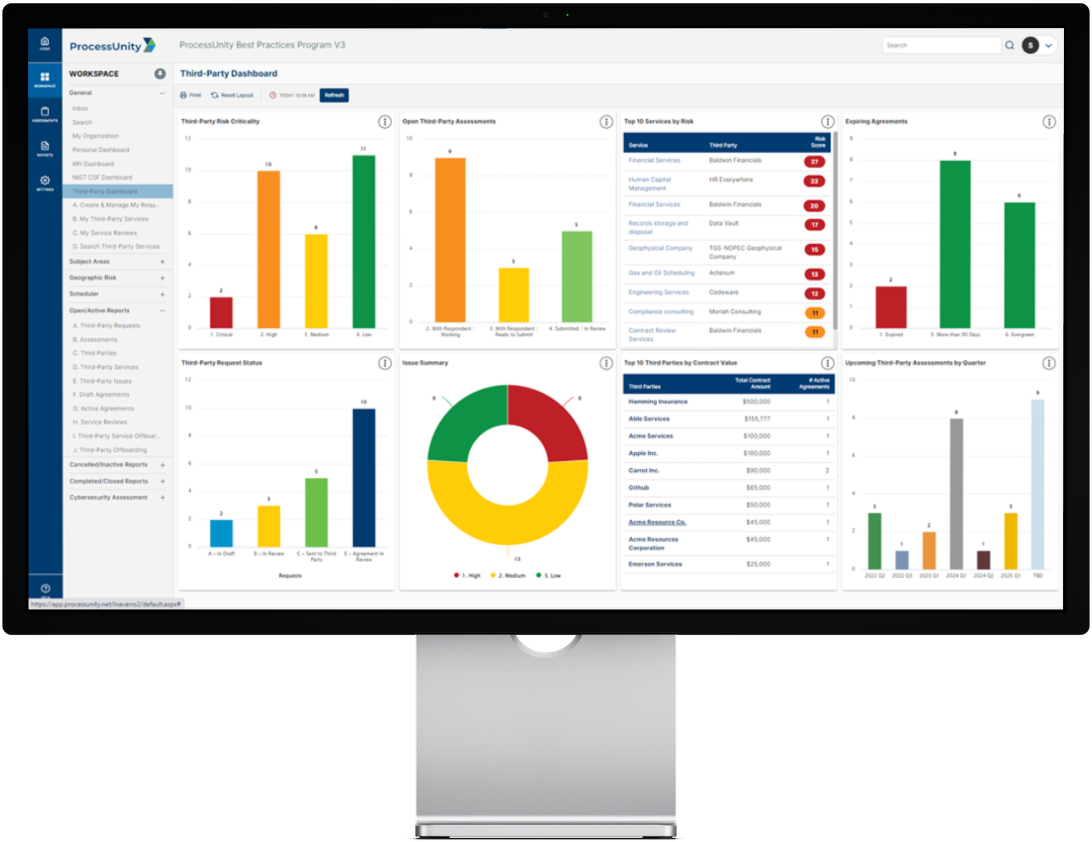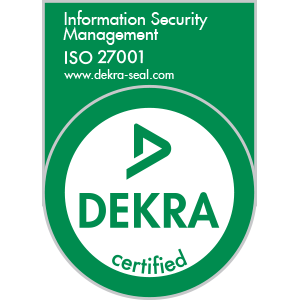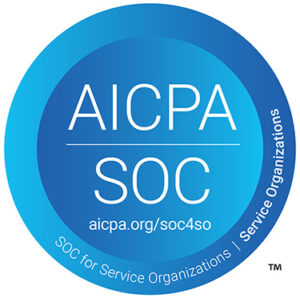ProcessUnity Security FAQs
The purpose of this page is to provide transparency into the safeguards that have been implemented to protect ProcessUnity’s Workflow Platform, Global Risk Exchange and our customers’ data. This summary is intended to address the most common questions that we receive from external stakeholders who are interested in the maturity and effectiveness of our security program.

Q: Does ProcessUnity have a team that is dedicated and responsible for the protection of customer data?
Yes. The ProcessUnity security team is tasked with the implementation of a comprehensive and effective risk management program that covers our enterprise corporate environment, the Workflow Platform and the Global Risk Exchange.
Q: Does ProcessUnity have a dedicated security officer?
Yes. ProcessUnity has an assigned and dedicated Chief Information Security Officer (CISO) who is responsible for the ProcessUnity security program and the management of the security team.
Q: Is the ProcessUnity security program based on industry-standard security best practices and control frameworks?
Yes. The ProcessUnity security program leverages concepts, and security and privacy controls from a number of global standards such as the NIST Special Publication 800 series, NIST CSF, ISO 27001/2, OWASP, GDPR, CCPA.
Q: Has ProcessUnity undergone an independent audit or certification of compliance with security standards?
Yes. On an annual basis ProcessUnity renews our SOC 2 Type 2 audit and ISO 27001:2022 certification. Note that the Global Risk Exchange is not currently included in the scope of these audits.
 |
 |
Q: Has ProcessUnity developed a security policy framework?
Yes. ProcessUnity has developed, and continually refines, a library of security policies, procedures, and plans. These documents are accessible by all ProcessUnity staff and are included in new hire and annual training. They cover standard security domains such as: identity and access management, configuration and change management, personnel security, and incident response. Policies, standards, and plans are approved by the ProcessUnity executive leadership.
Q: What are the core elements of the ProcessUnity security program?
ProcessUnity’s security program is based on an understanding of our assets, their criticality to both ProcessUnity and our customers, the internal and external threats to those assets, and the effectiveness of our controls in response to those threats. We utilize a risk-based approach where strategic planning and the prioritization of corrective actions is based on a qualitative and quantitative understanding of risks that impact our organization and our customers.
Q: Has ProcessUnity undergone penetration testing by an independent third party?
Yes. The Workflow Platform and the Global Risk Exchange each individually undergo penetration testing on an annual basis, at minimum, and after significant changes.
Q: What type of internal security risk or vulnerability assessments does ProcessUnity perform?
ProcessUnity uses multiple methods and techniques to evaluate our environments for security weaknesses or vulnerabilities. These methods include, but are not limited to:
- annual SOC 2 Type 2 and ISO 27001 compliance audits;
- annual, at minimum, independent penetration testing; and
- ongoing updates of the ProcessUnity assessment on the Global Risk Exchange, including evidence validation by Deloitte.
- automated, scheduled vulnerability scanning of operating systems, firmware, middleware, etc.,
- static and dynamic scanning of code repositories;
- software composition analysis scans of third-party code;
- security-focused systems testing as part of the ProcessUnity platform’s system development lifecycle (SDLC);
- manual audits/tests of security control implementation and effectiveness;
- security-focused interviews with ProcessUnity teams and individual personnel;
Q: Are ProcessUnity employees subject to a background screening prior to being provided access to any customer data?
Yes. All employees must successfully pass a background check before finalizing the job offer and onboarding process. New hires are not given access to any ProcessUnity systems or data until the background screening process is complete.
Q: Has ProcessUnity implemented a security awareness and training program?
Yes. ProcessUnity leverages an industry-standard tool to plan, develop, execute, and track security-focused training. All new hires are required to complete training within ten business days of onboarding. All employees are required to complete annual and quarterly security training. In addition, employees may be asked to complete unscheduled training based on the outcome of internal testing (e.g. phishing campaigns) or violations of security policy. All new hires sit with a security team member in their first two weeks of employment to discuss security policies, basic security principles, and specific security responsibilities that apply to their role.
Q: Does ProcessUnity process, transmit, or store any customers’ personally identifiable information (PII)?
Yes, but this is limited to business contact and usage information only. Specifically, we collect an individual’s name, business email address, business phone number (optional), and IP address when accessing our applications.
Q: Where are the Workflow Platform and Global Risk Exchange hosted, and what physical security controls are in place to protect customer data?
The Workflow Platform is hosted by Azure in regional facilities. All physical security controls directly associated with the application are inherited from Azure. For more information about Azure’s physical security program please visit: https://learn.microsoft.com/en-us/azure/security/fundamentals/physical-security
The Global Risk Exchange is hosted by Amazon Web Services (AWS) in US-East region datacenters. All physical security controls directly associated with the platform are inherited from AWS. For more information about AWS’s physical security program please visit: https://aws.amazon.com/compliance/data-center/controls/
ProcessUnity headquarters is located in Concord, Massachusetts. This facility is protected by safeguards that include electronic locks, badge readers, CCTV surveillance at all ingress and egress points, access logging and audits, and a centralized fire detection and suppression system.
Q: How are the Azure and AWS environments securely configured and managed?
Both environments are designed for resilience, leveraging multiple availability zones (AWS) or redundant cloud sites (Azure), autoscaling, and distributed denial of service (DDoS) protections.
We use hardened and regularly updated container images, and development and testing environments are fully separated from production.
Both environments produce verbose event logging that is centrally aggregated and monitored by industry-standard security information and event management (SIEM) tools.
If needed, our SOC 2 and ISO 27001 audits, independent penetration tests, and CyberGRX assessments contain more information about the technical controls in place to protect our customers’ data.
Q: How often does ProcessUnity backup customer data, and are data backups ever tested?
ProcessUnity performs full, hourly backups of the Workflow Platform’s production databases, and full, daily backups of the Global Risk Exchange production databases. Backups are tested monthly, at minimum.
Q: What authentication mechanisms are in place for users accessing the ProcessUnity application or the Global Risk Exchange?
Users of the Workflow Platform and Global Risk Exchange may choose between username and password, multi-factor authentication, and single sign-on.
Q: How can customers control what data and functionality their employees have access to while using the Workflow Platform or Global Risk Exchange?
We provide out of the box role-based access control (RBAC) to ensure that our customers can manage their accounts and instances in accordance with the concept of least privilege access.
Q: How does ProcessUnity encrypt data in transit and at rest?
All customer data (name, business email, business phone, assessment answers, etc.) is encrypted in transit using TLS 1.2 or better. Customer data is encrypted at rest via AES-256 strength encryption.
Q: Does ProcessUnity have a policy regarding the use of removable storage media?
Yes. The use of removable media to transmit or store customer data is strictly forbidden by policy and via technical controls. Any exceptions to this policy must be approved by the CISO. Exceptions undergo monthly access reviews to understand if there is still a need. USB exceptions require encryption and scanning of the device before it can be used.
Q: Does ProcessUnity have targets for service restoration in the event of a disaster?
Yes. ProcessUnity Platform: RTO is defined as 4 hours and our RPO is 1 hour. Global Risk Exchange: RTO is defined as 48 hours and our RPO is 24 hours.
Q: How does ProcessUnity ensure that their application code is free of vulnerabilities or flaws?
The ProcessUnity Platform and Global Risk Exchange follow a defined system development lifecycle (SDLC). All code changes must be approved by a product manager, a peer developer, and a tester before being deployed to the production environment. The SDLC process includes submitting all updated code repositories for code vulnerability scanning. We deploy application code by using a staged deployment process. The changes are applied first in the staging environment, where they are tested, before they are applied to the demo environment for additional testing, and finally on to the production environment. In addition, the ProcessUnity Platform is dynamically scanned by our code vulnerability scanning solution and is pen tested on an annual basis, at minimum.
Q: Does ProcessUnity have an incident response program in place?
Yes. Our incident response program is documented in the ProcessUnity Incident Response Plan and a library of incident playbooks that are focused on response procedures for specific types of incidents. We utilize a suite of industry- standard tools to assist in the identification, verification, containment, analysis, and removal of threats from our computing environments.
Q: Does ProcessUnity have an incident notification process in place?
Yes. We notify any potentially affected customers within a commercially feasible timeframe, and never longer than is required by contract.
Q: What should I do if I suspect I’ve observed a security incident related to ProcessUnity?
For your security, please note that our company domain is processunity.com. All legitimate email communications will come from addresses ending in @processunity.com (e.g., [email protected]) or ProcessUnity <[email protected]>. If you receive an email about a ProcessUnity job posting from a different domain, please report it to our security team immediately at [email protected].
To protect yourself from potential scams, please keep the following in mind:
- We will never ask for any payment or sensitive personal information (such as banking details, social security number, or copies of identification) during the recruitment process.
- We do not extend job offers without first conducting formal interviews which include a phone screen with our recruiter and multiple video interviews with the hiring team.
Contact ProcessUnity
Security Office
ProcessUnity, Inc.
33 Bradford Steet Concord, MA 07142
[email protected]